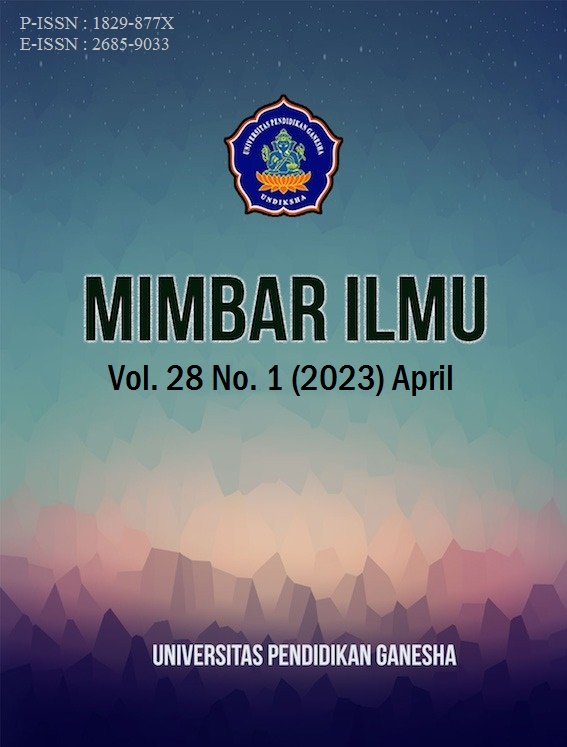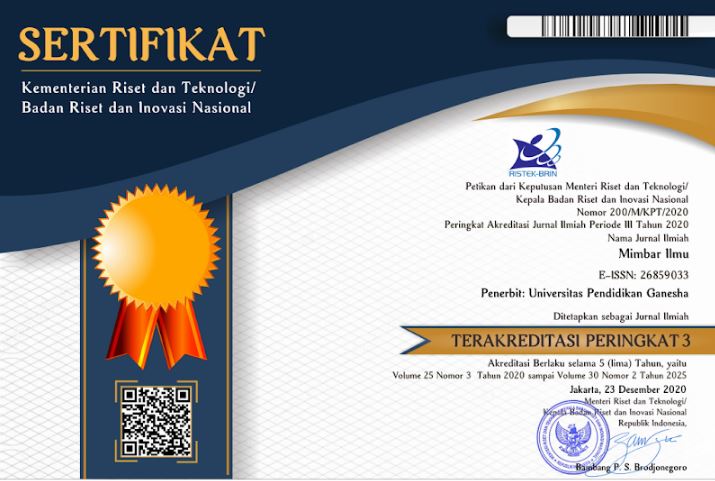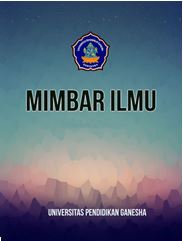Socio-Religious Education to Strengthen Harmony Between Hindus and Muslims with Multiculturalism
DOI:
https://doi.org/10.23887/mi.v28i1.59451Kata Kunci:
Multicultural, Hindu, Muslim, Pegayaman VillageAbstrak
The implementation of multicultural actions carried out by the community represents a life context that affirms differences. Different socio-cultural backgrounds do not make the local people segment but merge themselves into a diverse frame with the principle of egalitarianism. This study aims to analyze socio-religious education in the community to form collective awareness or a multicultural action in creating social relations. This research is classified as research using a qualitative approach. The subjects in this study were community leaders who played an important role in the village development process. Data collection in the study was carried out using observation, interviews, and document studies, with research instruments in the form of observation sheets and interviews. Data analysis techniques from this study include data collection, reduction, presentation, and conclusion. The study results show that social-religious education in Pegayaman Village has been well implemented. It can be seen from the synchronization and enculturation of Hindu conceptions of Tri Hita Karana and the conceptions of Islam, Faith, and Ihsan of Islam in various processes of community life. These two conceptions create a meeting point as a basis for universal religious values that embody social actions that lead to the application of respect and acceptance of differences.
Referensi
Adams, T. E. (2017). Critical Autoethnography, Education and a Call for Forgiveness. International Journal of Multicultural Education, 19(1), 79–88. https://doi.org/10.18251/ijme.v19i1.1387. DOI: https://doi.org/10.18251/ijme.v19i1.1387
Ahn, S. (2020). 1.5-Generation Korean Americans Transnational Identity: Stories From Four College Students. International Journal of Multicultural Education, 22(1), 16–34. https://doi.org/10.18251 /ijme.v22i1.1961. DOI: https://doi.org/10.18251/ijme.v22i1.1961
Ashamwi, Y. P. El, Sanchez, M. E. H., & Carmona, J. F. (2018). Testimonialista Pedagogues: Testimonio Pedagogy in Critical Multicultural Education. International Journal of Multicultural Education, 20(1), 67–85. https://doi.org/10.18251/ijme.v20i1.1524. DOI: https://doi.org/10.18251/ijme.v20i1.1524
Baker, P. S. (2018). A Multicultural Education Praxis: Integrating Past and Present, Living Theories and Practice. International Journal of Multicultural Education, 20(1), 48–66. https://doi.org/10.18251 /ijme.v20i1.1518. DOI: https://doi.org/10.18251/ijme.v20i1.1518
Beiner, R. (2021). Dangerous Minds in Dangerous Times. Thesis Eleven, 163(1), 29–42. https://doi.org/10.1177/07255136211005989. DOI: https://doi.org/10.1177/07255136211005989
Bennett, H., & Brunner, R. (2022). Nurturing The Buffer Zone: Conducting Collaborative Action Research in Contemporary Contexts. Qualitative Research, 22(1), 74–92. https://doi.org/10.1177/ 1468794120965373. DOI: https://doi.org/10.1177/1468794120965373
Birks, M., Hoare, K., & Mills, J. (2019). Grounded Theory: The FAQs. International Journal of Qualitative Methods, 18, 1–7. https://doi.org/10.1177/1609406919882535. DOI: https://doi.org/10.1177/1609406919882535
Boileau, E. C., Gaboury, I., Breton, M., & Denis, J. L. (2020). Organizational Ethnographic Case Studies: Toward a New Generative In-Depth Qualitative Methodology for Health Care Research? International Journal of Qualitative Methods, 19(1), 1–17. https://doi.org/10.1177/ 1609406920926904. DOI: https://doi.org/10.1177/1609406920926904
Brandmayr, F. (2021). Are Theories Politically Flexible? Sociological Theory, 39(2), 103–125. https://doi.org/10.1177/07352751211016036. DOI: https://doi.org/10.1177/07352751211016036
Byrne, A. (2021). Naming My World: Finding My Voice. Irish Journal of Sociology, 29(3), 286–296. https://doi.org/10.1177/07916035211030374. DOI: https://doi.org/10.1177/07916035211030374
Canlas, I. P., & Karpudewan, M. (2020). Blending the Principles of Participatory Action Research Approach and Elements of Grounded Theory in a Disaster Risk Reduction Education Case Study. International Journal of Qualitative Methods, 19(1), 1–13. https://doi.org/10.1177/ 1609406920958964. DOI: https://doi.org/10.1177/1609406920958964
Cashman, C. (2021). Covid-19, Crisis, and The Philosophy of Money: The Social and Qualitative Essence of Money. Irish Journal of Sociology, 29(1), 97–101. https://doi.org/10.1177/0791603520941189. DOI: https://doi.org/10.1177/0791603520941189
Chauvette, A., Makaroff, K. S., & Molzahn, A. E. (2019). Open Data in Qualitative Research. International Journal of Qualitative Methods, 18(1), 1–6. https://doi.org/10.1177/1609406918823863. DOI: https://doi.org/10.1177/1609406918823863
Chicas, J. M., Castillo, M., Ramos, P., & Guzman, B. L. (2019). Computing With Relevance and Purpose: A Review of Culturally Relevant Education in Computing Equity Inequities in Technology and Computer Programming Method Results and Discussion Limitations and Future Directions Conclusion References Appendix A Appendix. International Journal of Multicultural Education, 21(1), 125–155. https://files.eric.ed.gov/fulltext/EJ1208280.pdf. DOI: https://doi.org/10.18251/ijme.v21i1.1745
Chin, T. D., Cowley, M. P. S., & Worlds, M. (2020). Whitewashing Through Film: How Educators Can Use Critical Race Media Literacy to Analyze Hollywood’s Adaptation of Angie Thomas “The Hate U Give.” International Journal of Multicultural Education, 22(2), 129–144. https://doi.org/10.18251/ijme.v22i2.2457. DOI: https://doi.org/10.18251/ijme.v22i2.2457
Christopher, E. (2020). Capturing Conflicting Accounts of Domestic Labour: The Household Portrait as a Methodology. Sociological Research Online, 26(3), 451–468. https://doi.org/10.1177/ 1360780420951804. DOI: https://doi.org/10.1177/1360780420951804
Cooper, M. (2020). ‘21st Century Welfare’ in Historical Perspective: Disciplinary Welfare in the Depression of the 1930s and Its Implications for Today. Sociological Research Online, 26(2), 326–342. https://doi.org/10.1177/1360780420937741. DOI: https://doi.org/10.1177/1360780420937741
Davidson, J. P. L. (2021). Looking Laterally: The Literary Utopia and The Task of Critical Social Theory. Current Sociology, 69(7), 1069–1084. https://doi.org/10.1177/0011392120969758. DOI: https://doi.org/10.1177/0011392120969758
Dyke, E., Sabbagh, J. El, & Dyke, K. (2020). “Counterstory Mapping Our City”: Teachers Reckoning With Latinx Students Knowledges, Cultures and Communities. International Journal of Multicultural Education, 22(2), 30–45. https://doi.org/10.18251/ijme.v22i2.2445. DOI: https://doi.org/10.18251/ijme.v22i2.2445
Forbes, A., Ritchie, S., Walker, J., & Young, N. (2020). Applications of Two-Eyed Seeing in Primary Research Focused on Indigenous Health: A Scoping Review. International Journal of Qualitative Methods, 19(1), 1–18. https://doi.org/10.1177/1609406920929110. DOI: https://doi.org/10.1177/1609406920929110
Fowler, B. (2021). Autoanalysis, With Particular Reflections on Sociology. Journal of Classical Sociology, 21(3–4), 263–279. https://doi.org/10.1177/1468795X211032418. DOI: https://doi.org/10.1177/1468795X211032418
Geiger, B. B. (2021). Performing Trustworthiness: The ‘Credibility Work’ of Prominent Sociologists. Sociology, 55(4), 785–802. https://doi.org/10.1177/0038038520977805. DOI: https://doi.org/10.1177/0038038520977805
Gilmore, B., McAuliffe, E., Power, J., & Vallieres, F. (2019). Data Analysis and Synthesis Within a Realist Evaluation: Toward More Transparent Methodological Approaches. International Journal of Qualitative Methods, 18(1), 1–11. https://doi.org/10.1177/1609406919859754. DOI: https://doi.org/10.1177/1609406919859754
Hayes, G., Cammiss, S., & Doherty, B. (2021). Disciplinary Power and Impression Management in The Trials of The Stansted 15. Sociology, 55(3), 561–581. https://doi.org/10.1177/0038038520954318. DOI: https://doi.org/10.1177/0038038520954318
Heikkila, R., & Katainen, A. (2021). Counter-Talk as Symbolic Boundary Drawing: Challenging Legitimate Cultural Practices in Individual and Focus Group Interviews in The Lower Regions of Social Space. Sociological Review, 69(5), 1029–1050. https://doi.org/10.1177/00380261211014467. DOI: https://doi.org/10.1177/00380261211014467
Holmes, H., & Ehgartner, U. (2021). Lost Property and The Materiality of Absence. Cultural Sociology, 15(2), 252–270. https://doi.org/10.1177/1749975520969007. DOI: https://doi.org/10.1177/1749975520969007
Irwin, C. E. (2021). Catching a Break: Accessibility, Empathy, and Covid-19. Qualitative Inquiry, 27(7), 798–805. https://doi.org/10.1177/1077800420967889. DOI: https://doi.org/10.1177/1077800420967889
Kim, J.-H. (2018). Understanding the “Other”: Rethinking Multiculturalism in South Korea through Gadamer’s Philosophical Hermeneutics Multiculturalism as a Global Phenomenon Theoretical Framework The Evolution and Challenges of Multiculturalism in South Korea Multicultural . International Journal of Multicultural Education, 20(1), 102–117. https://ijme-journal.org/index.php/ijme/article/download/1509/1208/8113. DOI: https://doi.org/10.18251/ijme.v20i1.1509
Koonce, J. B. (2018). Critical Race Theory and Caring as Channels for Transcending Borders Between an African American Professor and Her Latina/o students. International Journal of Multicultural Education, 20(2), 101–116. https://doi.org/10.18251/ijme.v20i2.1432. DOI: https://doi.org/10.18251/ijme.v20i2.1432
Laiti, O. K. (2019). Social Aspects of Learning: Sámi People in the Circumpolar North Finland Social Learning in Sámi and Arctic Pedagogies Research Context: Game Programming with Sámi Adolescents Methodology Ethical Issues and Limitations Findings Discussion, Implications, a. International Journal of Multicultural Education, 21(1), 5–21. https://files.eric.ed.gov/fulltext /EJ1208400.pdf. DOI: https://doi.org/10.18251/ijme.v21i1.1728
Lanza, A. (2021). Looking For a Sociology Worthy of Its Name: Claude Lefort and His Conception of Social Division. Thesis Eleven, 166(1), 70–87. https://doi.org/10.1177/07255136211044609. DOI: https://doi.org/10.1177/07255136211044609
Lawyer, G. (2018). The Dangers of Separating Social Justice from Multicultural Education: Applications in Higher Education How I Came to Multicultural Education Reflecting on Social Justice and Multicultural Education Analyzing the Experience Multicultural Education: Is it . International Journal of Multicultural Education, 20(1), 86–101. https://ijmejournal.org/index.php/ijme/ article/view/1538. DOI: https://doi.org/10.18251/ijme.v20i1.1538
Lee, C. P., & Curtis, J. H. (2017). Into The Realm of The Politically Incorrect: Intercultural Encounters in a Service-Learning Program. International Journal of Multicultural Education, 19(2), 163–181. https://doi.org/10.18251/ijme.v19i2.1239. DOI: https://doi.org/10.18251/ijme.v19i2.1239
Li, A., & Hu, A. (2021). Community Contexts, Socioeconomic Status, and Meritocratic Beliefs and Perceptions in China. Chinese Journal of Sociology, 7(3), 470–493. https://doi.org/10.1177/2057150X211023235. DOI: https://doi.org/10.1177/2057150X211023235
Malmqvist, J., Hellberg, K., Mollas, G., Rose, R., & Shevlin, M. (2019). Conducting the Pilot Study: A Neglected Part of the Research Process? Methodological Findings Supporting the Importance of Piloting in Qualitative Research Studies. International Journal of Qualitative Methods, 18(1), 1–11. https://doi.org/10.1177/1609406919878341. DOI: https://doi.org/10.1177/1609406919878341
Marx, S., & Kim, Y. (2019). Technology for Equity and Social Justice in Education: Introduction to The Special Issue. International Journal of Multicultural Education, 21(1), 1–4. https://doi.org/10.18251/IJME.V21I1.1939. DOI: https://doi.org/10.18251/ijme.v21i1.1939
Marx, S., Pennington, J. L., & Chang, H. (2017). Critical Autoethnography in Pursuit of Educational Equity: Introduction to The IJME Special Issue. International Journal of Multicultural Education, 19(1), 1–6. https://doi.org/10.18251/ijme.v19i1.1393. DOI: https://doi.org/10.18251/ijme.v19i1.1393
Mathew, M. V. (2022). Book Review: Benjamin Bratton (2021), The Revenge of The Real: Politics for a Post-Pandemic World. Science, Technology and Society, 27(1), 147–149. https://doi.org/10.1177/09717218211047021. DOI: https://doi.org/10.1177/09717218211047021
Mayo, L., Serra del Pino, J., & Jones, C. (2021). Postnormal Praxis Putting Postnormal Concepts to Work. World Futures Review, 13(2), 86–100. https://doi.org/10.1177/19467567211031156. DOI: https://doi.org/10.1177/19467567211031156
Mellor, P. A., & Shilling, C. (2021). Edgework, Uncertainty, and Social Character. Sociological Research Online, 26(4), 959–975. https://doi.org/10.1177/13607804211002841. DOI: https://doi.org/10.1177/13607804211002841
Mwambari, D. (2019). Local Positionality in the Production of Knowledge in Northern Uganda. International Journal of Qualitative Methods, 18(1), 1–12. https://doi.org/10.1177/1609406919864845. DOI: https://doi.org/10.1177/1609406919864845
Nakaya, A. (2018). Overcoming Ethnic Conflict through Multicultural Education: The Case of West Kalimantan, Indonesia social identity Multicultural Education, Transformative Citizenship Education, and Social Identity Methods Multiculturalism in Indonesia’s Education System . International Journal of Multicultural Education, 20(1), 118–137. https://ijmejournal.org/index.php/ijme/article/view/1549. DOI: https://doi.org/10.18251/ijme.v20i1.1549
Nikunen, M., & Ikonen, H. M. (2021). Moral Orders of Mobility: Youth Aspirations and ‘Doing’ Social Position in Finland. Sociological Research Online, 26(4), 908–925. https://doi.org/10.1177/1360780421997838. DOI: https://doi.org/10.1177/1360780421997838
Outhwaite, W. (2022). Existence as a Predicament. Journal of Classical Sociology, 22(1), 95–99. https://doi.org/10.1177/1468795X211049240. DOI: https://doi.org/10.1177/1468795X211049240
Paechter, C., & Marguerite, A. (2020). Communities of Practice of Transition: An Analytical Framework for Studying Change-Focussed Groups. Sociological Research Online, 26(2), 360–376. https://doi.org/10.1177/1360780420944966. DOI: https://doi.org/10.1177/1360780420944966
Qureshi, H. A., & Unlu, Z. (2020). Beyond the Paradigm Conflicts: A Four-Step Coding Instrument for Grounded Theory. International Journal of Qualitative Methods, 19(1), 1–10. https://doi.org/10.1177/1609406920928188. DOI: https://doi.org/10.1177/1609406920928188
Rashid, Y., Rashid, A., Warraich, M. A., Sabir, S. S., & Waseem, A. (2019). Case Study Method: A Step-by-Step Guide for Business Researchers. International Journal of Qualitative Methods, 18(1), 1–13. https://doi.org/10.1177/1609406919862424. DOI: https://doi.org/10.1177/1609406919862424
Reed-Danahay, D. (2017). Bourdieu and Critical Autoethnography: Implications for Research, Writing and Teaching. International Journal of Multicultural Education, 19(1), 144–154. https://doi.org/10.18251/ijme.v19i1.1368. DOI: https://doi.org/10.18251/ijme.v19i1.1368
Rizkiyah, T., & Istiani, N. (2021). Nilai Pendidikan Sosial Keberagamaan Islam Dalam Moderasi Beragama Di Indonesia. POROS ONIM: Jurnal Sosial Keagamaan, 2(2), 86–96. https://doi.org/10.53491/porosonim.v2i2.127. DOI: https://doi.org/10.53491/porosonim.v2i2.127
Sather, A. C.-, Kenealy, A., Rippel, M., & Beyer, J. (2018). Discovering Voices: College Students and Middle Schoolers Explore Identities, Differences, and Connections Through the Structure of a Poem. International Journal of Multicultural Education, 20(2), 133–149. https://doi.org/10.18251/ijme. v20i2.1564. DOI: https://doi.org/10.18251/ijme.v20i2.1564
Schubert, C., & Kolb, A. (2021). Designing Technology, Developing Theory: Toward a Symmetrical Approach. Science Technology and Human Values, 46(3), 528–554. https://doi.org/10.1177/0162243920941581. DOI: https://doi.org/10.1177/0162243920941581
Setiawatri, N., & Kosasih, A. (2019). Implementasi Pendidikan Karakter Peduli Sosial Pada Masyarakat Pluralisme Di Cigugur Kuningan. Jurnal Pendidikan Karakter, 9(2), 179–192. https://doi.org/10.21831/jpk.v9i2.22986. DOI: https://doi.org/10.21831/jpk.v9i2.22986
Sleeter, C. (2018). Multicultural Education Past, Present, and Future: Struggles for Dialog and Power-Sharing Intercultural Education Multicultural Education Comes Into Being Twenty-Two Years and Two Emblematic Experiences Ago Elites React Neoliberal Multicultural Education? International Journal of Multicultural Education, 20(1), 5–20. https://www.academia.edu/36046689. DOI: https://doi.org/10.18251/ijme.v20i1.1663
Suryani, I., Tanjung, A. R., Siregar, R. D., & Siregar, A. S. (2021). Meningkatkan Pemahaman Masyarakat Terhadap Keagamaan Melalui Program Pendidikan dan Sosial Keagamaan. Edumaspul: Jurnal Pendidikan, 5(2), 15–20. https://doi.org/10.33487/edumaspul.v5i2.1998. DOI: https://doi.org/10.33487/edumaspul.v5i2.1998
Susen, S., & Turner, B. S. (2021). Classics and Classicality: JCS After 20 years. Journal of Classical Sociology, 21(3–4), 227–244. https://doi.org/10.1177/1468795X211034946. DOI: https://doi.org/10.1177/1468795X211034946
Tebeau, M. (2021). A Journal of The Plague Year: Rapid-Response Archiving Meets the Pandemic. Collections: A Journal for Museum and Archives Professionals, 17(3), 199–206. https://doi.org/10.1177/1550190620986550. DOI: https://doi.org/10.1177/1550190620986550
Tomaszewski, L. E., Zarestky, J., & Gonzalez, E. (2020). Planning Qualitative Research: Design and Decision Making for New Researchers. International Journal of Qualitative Methods, 19(1), 1–7. https://doi.org/10.1177/1609406920967174. DOI: https://doi.org/10.1177/1609406920967174
Uzum, B., Yazan, B., Avineri, N., & Akayoglu, S. (2019). Preservice teachers’ discursive constructions of cultural practices in a multicultural telecollaboration. International Journal of Multicultural Education, 21(1), 82–104. https://doi.org/10.18251/IJME.V21I1.1777. DOI: https://doi.org/10.18251/ijme.v21i1.1777
Williamson, V., Murphy, D., Castro, C., Vermetten, E., Jetly, R., & Greenberg, N. (2021). Moral Injury and The Need to Carry Out Ethically Responsible Research. Research Ethics, 17(2), 135–142. https://doi.org/10.1177/1747016120969743. DOI: https://doi.org/10.1177/1747016120969743
Wohlfart, O. (2020). “Digging Deeper?”: Insights From a Novice Researcher. International Journal of Qualitative Methods, 19(1), 1–5. https://doi.org/10.1177/1609406920963778. DOI: https://doi.org/10.1177/1609406920963778
Woodgate, R. L., Tennent, P., & Barriage, S. (2020). Creating Space for Youth Voice: Implications of Youth Disclosure Experiences for Youth-Centered Research. International Journal of Qualitative Methods, 19(1), 1–13. https://doi.org/10.1177/1609406920958974. DOI: https://doi.org/10.1177/1609406920958974
Yuan, H. (2018). Educating Culturally Responsive Han Teachers: Case Study of a Teacher Education Program in China. International Journal of Multicultural Education, 20(2), 42–57. https://doi.org/10.18251/ijme.v20i2.1609. DOI: https://doi.org/10.18251/ijme.v20i2.1609
Zhang, J. Y. (2021). (Bio) Politics of Existence and Social Change: Insights From The Good Food Movement. Sociological Review, 69(3), 647–663. https://doi.org/10.1177/00380261211009069. DOI: https://doi.org/10.1177/00380261211009069
Unduhan
Diterbitkan
Cara Mengutip
Terbitan
Bagian
Lisensi
Hak Cipta (c) 2023 I Wayan Suwendra

Artikel ini berlisensiCreative Commons Attribution-ShareAlike 4.0 International License.
This work is licensed under a Creative Commons Attribution-ShareAlike 4.0 International License.
Authors who publish with this journal agree to the following terms:
- Authors retain copyright and grant the journal right of first publication with the work simultaneously licensed under a Creative Commons Attribution License that allows others to share the work with an acknowledgment of the work's authorship and initial publication in this journal.
- Authors are able to enter into separate, additional contractual arrangements for the non-exclusive distribution of the journal's published version of the work (e.g., post it to an institutional repository or publish it in a book), with an acknowledgment of its initial publication in this journal.
- Authors are permitted and encouraged to post their work online (e.g., in institutional repositories or on their website) prior to and during the submission process, as it can lead to productive exchanges, as well as earlier and greater citation of published work.









